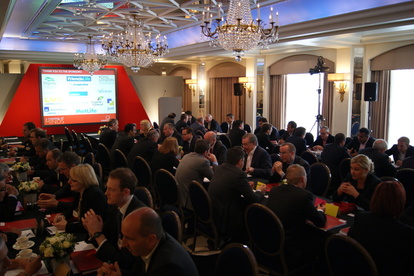
Moderator: Collette Dunn, Milliman
Expert: Mark Adams – Vice Media
Millennials are likely to be the first generation since the turn of the last century to be financially worse off than the previous generation. The reasons are multiple and include university debt, unaffordability of housing and wage stagnation. In light of this, it is a good time for financial services to engage with Millennials and to ensure that they understand the world of FS and how they can turn that knowledge to their advantage.
Mark introduced the session with Vice’s model for innovation. Starting with their target customers, Vice seeks genuine ‘empathy’ with them. This ‘empathy’ means a high level of understanding of their wants, needs, behaviours as well as reactions to products and services. Vice then moves to the ‘deposit’ stage which involves content development in terms of tangible services which are either differentiated or low cost. Throughout this innovation process, Vice ensures that ‘authentic ROI’ is at the forefront, which means that profitability is a key concern throughout.
Millennials are much more inclined to be influenced by the ‘gamification.’ Targeting by social demographic needs to stop – A key segment of consumers are being misrepresented due to the generalisation of age, gender and other demographics. Building confidence is a key factor – Jargon, information needs to be explained. Very little patience and no sense of loyalty so the initial online experience has to be slick and seamless. FS providers should be looking at online communities and social media to enhance their product distribution.
Millennials are all online, this massive emerging market must be utilised to its full capability.
Vice has captured a huge audience and created massive engagement can banks do the same?
Loyalty has become tough to win over. Using emotion to drive engagement and connect with those millennials – a ‘personal’ relationship will engage them and win trust. Creating a sense of belonging and community is vital – Relating to loyalty as this will be a key determinant of whether they are loyal.
It was agreed that not many of the organisations in the room focussed on Millennials. Mark shared Vice’s view that Millennials lacked confidence and interest in financial services, and found it boring. He said that many responses from Millennials relate to ‘pain, stress and fear’. They need reassurance about their financial goals.
Mark posited, and it was generally agreed, that the term ‘Millennial’ is not constrained by age, but rather an attitude. There are ‘Millennials’ who are over 25 years of age! We discussed whether large financial services organisations can act like challenger organisations. We had some examples of incumbents trying to enable this behaviour, for example Aviva setting-up its ‘Digital Garage’. Much of social media and current Millennial behaviour is about seeking a sense of belonging and some mentioned that old mutual, for example the Co-op, had achieved this in the past.
We touched on brand and advertising and how social media cannot be bought. It is about engaging people and getting them to become advocates for your brand. We noted that regulations do not facilitate plain English and that current literature can create a sense of fear.



